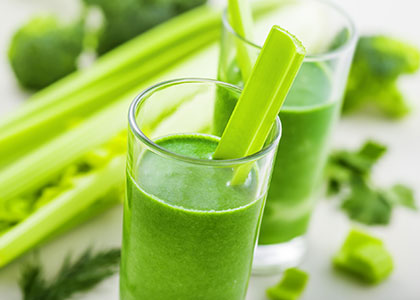
The Celery Juice Trend
By Claire Georgiou, Reboot Naturopath, B.HSc ND
Working with Reboot and within the juicing realm for many years, the celery juice craze even struck me as a little strange. How can the very humble little celery stick all ON ITS OWN (without other nutrient dense vegetables and fruits) make such a splash? It didn’t make sense to me!
Celery is a great addition in any juice because it can help water down strong tasting ingredients, add a mild pleasant taste with an electrolyte boost and provide a great base in any juice recipe.
So what’s the trendy part?
Questions I started asking myself:
- Are the benefits that people are experiencing due to the fact they are actually hydrating themselves on rising with an electrolyte boost, which in itself can offer a myriad of health benefits?
- Is it one or many of the plant compounds found in celery (or some that haven’t been identified) particularly that offer something extra special for human health? But.. so do all vegetables and that’s why we love fresh juice combos!
- Are people replacing unhealthy breakfast choices or beverages with celery juice, naturally reducing their intake of sugar, caffeine or refined carbohydrates? A 16oz glass of celery juice is pretty filling and when we’re well hydrated we tend to make healthier choices.
- Or is it just a new trend that’s holds no basis?
But I looked deeper into this humble juiced veggie.
The Many Benefits of Celery
It’s a great source of vitamin K, vitamin A, potassium, calcium, folate and sodium along with other vitamins and minerals. Juicing a 16oz serving gives you a large amount of celery, without insoluble fibre it is very easily absorbed and assimilated. One 16oz glass is equal to 1 bunch of celery which is a lot – and therefore provides a large quantity of all these nutrients.
When you juice this much celery and drink it, you’re consuming large amounts of nutrients, taking in consideration that you may lose a small amount in the pulp, there will be approximately 25-50 percent of some of the minerals and vitamins as listed above, to give you an example calcium intake reaches 150-200mg, magnesium 40-56mg, potassium 1000-1300mg, folate 140-185mcg while the vitamin A and K are reaching 50 percent of your daily recommended allowance suggestions. (This info is based on a bunch of celery with 8 stalks.)
The claims of celery juice are far and wide, from helping gut health to many other health problems such as thyroid disease, eczema, psoriasis, acne, SIBO, constipation, chronic fatigue syndrome, blood sugar issues, migraines, acid reflux, high blood pressure, and more.
Studies do support some if its health claims:
Some of the celery’s phytonutrients include: phenolic acids, flavones like luteolin, flavonols like quercetin, kaempferol, dihydrostilbenoids, phytosterols and furanocoumarins.
Anti-inflammatory benefits
This study found that celery contains unidentified anti-inflammatory properties especially flavonoid and polyphenol antioxidants that help to reduce inflammation. Inflammation is often a contributing cause of many diseases such as cancer, cardiovascular disease and arthritis.
Cardiovascular benefits
A study found rats who were fed a high-fat diet for eight weeks that had been given celery extract showed significantly lower levels of lipids in their blood, particularly triglycerides and LDL cholesterol, compared to the control group.
Hypertension (High blood pressure)
Celery seeds are well known for their anti-hypertensive benefits, so celery juice may have similar effects.
Gut healing
Recent research suggests that the antioxidants in celery could also help improve stomach lining and reduce the risk of gastric ulcers. A study on rats consuming celery extract had fewer ulcers and more protected stomach linings due to the apiuman content, a pectin-based polysaccharide found in celery.
Celery seeds have also been found to fight against helicobacter pylori infections, so consuming regular quantities of celery juice may also offer these health benefits when consumed as a juice.
Other scientific articles link celery extracts to fighting cancer, treating UTIs, protecting liver cells, reducing bloating and aiding in weight loss.
In conclusion, it looks like including more celery in our juices is a definite winner!
Boosting your juice combos with extra celery and perhaps including a pure celery juice on rising before a breakfast juice or a healthy plant-based breakfast could be the key to gaining greater health outcomes!
Here at Reboot we have had the pleasure of witnessing the powers of juice for many years with loads of testimonials on the life-changing benefits of fresh juice.
We encourage people to include one to two juices per day to maintain and support good health.